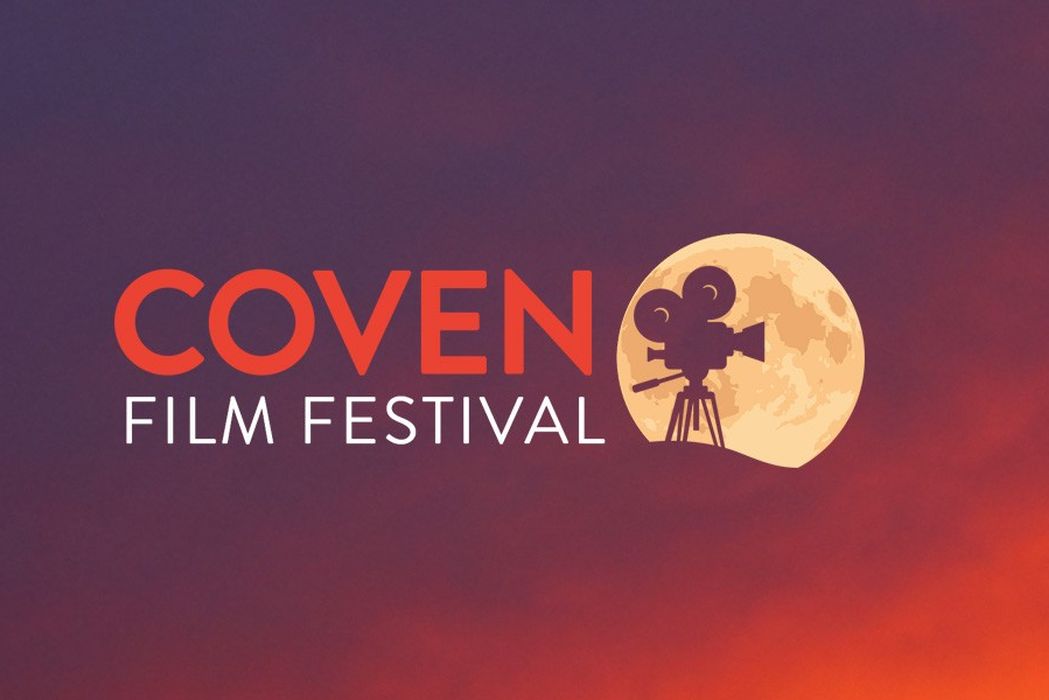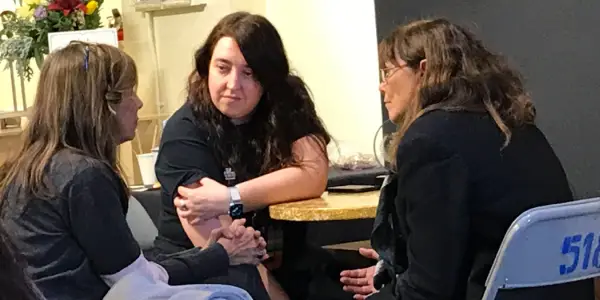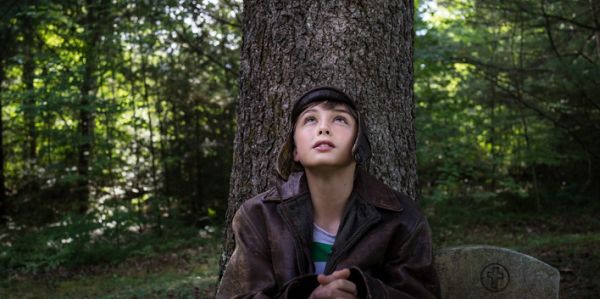Seeing Through The Eyes Of The Beloved: A Conversation Between Karen Allen & Cameo Wood At COVEN Film Festival

Deborah French Frisher writes interviews, cultural & social criticism, screenplays,…
What can be more promising than to have your short film screened at Cannes? For filmmakers Karen Allen and Cameo Wood, making a new friend, there, in 2016 that they could count on throughout the impending swirl of a year-long film festival circuit surpassed the glamour and crème de la crème buzz.
When Film Inquiry hosted a conversation between the two women at January 2020’s COVEN Film Festival in San Francisco’s Mission District, their commitment to excellence in the industry was equalled by the radiance of a mutual whole-hearted appreciation for one another.
“What do we talk about?” Karen asked Cameo with a tone of delight, when they first sat at the small table displaying COVEN Film Festival’s awards, and both women laughed out loud with joy. Allen was there screening her short indie, and Wood was multitasking as Founder and Co-Producer of COVEN.
A solid friendship had evolved from that first year when both women were making the festival rounds with their award-winning short films. When festival experiences devalued the filmmaker, Allen said that she discovered Wood’s responses to absurd situations resonant with her own. When the experience was generous toward the filmmakers of short films, as some were, according to Allen, they both felt the appreciation.
“Our projects were never in direct competition,” Cameo recalled, “so we could support each other and celebrate when one of our projects was awarded as if it were our own.”

The two women learned to count on each other for clarity and caring during Karen Allen’s debut pivot from celebrated actress of Animal House and Raiders of the Lost Ark fame to director of the short film jewel A Tree. A Rock. A Cloud., and Cameo Wood’s emergence at the top of her game with sci fi short Real Artists that went on to capture an Emmy award.
Some film festivals exploited filmmakers, were unwelcoming, and negligent of what it requires for indies to have their work seen. “We pay for our filmmakers to come here [to COVEN],” Cameo said.
“Not all festivals do that,” Karen explained, “and the burden of costs and arrangements gets shouldered by the filmmaker.” The two of them recalled the festivals that charged an entry fee, while the filmmaker was expected to pay for their own transportation and housing during the festival, and on top of that, extra fees were demanded to display the film poster or to offer merch. These daunting costs are indignities to independent filmmakers and create barriers of entry and participation at the same time that the festivals are making their profits from exhibiting the films!
Out of those experiences, COVEN Film Festival was conceived. “I wanted to offer a filmmaker-centered festival that would support, nourish, and treat filmmakers like the beloved creators that they are,” Cameo said.
This writer had just filled up her bamboo plate of farm-to-table freshness from the bountiful table in the VIP lounge that was restocked all weekend for COVEN Fest filmmakers before the hosted conversation and after the screening of Allen’s short adaptation from a Carson McCullers story that Karen has loved since her youth.
Allen’s filmmaking debut is a tender rendering of a conversation between an elder man and a boy-of-age about love. According to Allen, A Tree. A Rock. A Cloud., portrays the kind of love between men that is not the same story as the equally valid one representative of gay male relationships, and, also seldom seen on screen.
Aside from its refreshing pacing, the camera’s long single takes that predominate the film’s aesthetic settles the viewer’s eye, now accustomed to post-modern fast edits and jarring handheld movements.
“There is a stillness evoked by that choice,” Cameo said. Both agreed that the jumping camera popular today is often a distraction from feeling something. Allen’s film is an exquisite meditation on presence in form and content, and the viewer is invited to sit with it. On matters of feeling, both women agreed that films have not treated affection between women with the same avoidance it has for men. “Audiences are used to seeing women friends embrace or dance together,” Allen said, then gleefully recalled with Wood, “We’ve danced together!”

Allen described an unexpected obstacle that her film faced when submitting the short to festivals. With most festivals defining a short as any film under forty minutes, she was certain that hers, clocking in around a half hour would fit into programming, only to learn later that while festivals state these timing requirements for submission, in fact, it is the shorter shorts that are selected. “Mike Plante, Senior Programmer for Sundance has been publicly clear about the fact that the indie film festival has not accepted a short over thirteen minutes in over a decade, all the while maintaining for entry the industry definition of under forty minutes,” Cameo said.
When asked about Karen’s ever-growing passion for acting as enlivening, and how ageism impacts casting, Karen recalled coming back into the film business after raising her son and making professional choices that gave him solid roots during his formative years. “I was in my fifties when he was ready for me to take off again. I’d audition for someone in their fifties, and I was told that I looked too young. Then, I’d audition for a role of a woman in her forties and I was told I was too old. It was tough going there for a while.”
“I see you playing a woman who is delighted! Your delight lights up a screen,” Cameo tells her friend, whose eyes twinkle with a palpable illumination from within her. Karen spoke of recent roles she’s played that have been sad characters or, in one case, someone longing for the lost feeling of delight. Allen is looking to direct again a work adapted from a living playwright and is in the process of finding funds to support the playwright in creating the adaptation to film.
The subject turned back to A Tree. A Rock. A Cloud., and how more people can experience the vulnerability and contemplative quality of the film featured at COVEN Film Festival. “I need to find other platforms,” Karen was thinking out loud. “What about television?” Cameo lit up. Referring to COVEN’s festival co-producer Connie Jo Sechrist, “We’ve been developing our skill at distribution.” And the COVEN Film Festival dynamic duo has been meeting with success.
“What about PBS?” Cameo asks Karen. Karen is visibly excited by the idea, “You can get it on PBS?” Karen turns to me, “There’s your conversation!”
And, we are all smiling as the friendship that debuted at Cannes in 2016 takes off with another idea on behalf of each other.
Find more information about COVEN Film Festival here.
Does content like this matter to you?
Become a Member and support film journalism. Unlock access to all of Film Inquiry`s great articles. Join a community of like-minded readers who are passionate about cinema - get access to our private members Network, give back to independent filmmakers, and more.
Deborah French Frisher writes interviews, cultural & social criticism, screenplays, plays, and poetry. Her short film script Elder Lust placed as a finalist in the 2019 WiM CAMERADERIE Initiative.With experience as a director of short films and long form theater, her 2020 resolution is to engage in community with her work by sending it out towards publication and production.













